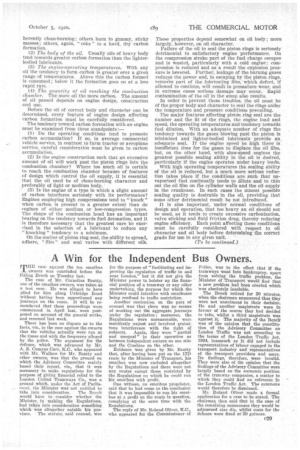A Win for the Independent Bus Owners.
Page 51

If you've noticed an error in this article please click here to report it so we can fix it.
THE case against the ten omnibus owners was concluded before the Ealing Bench on Tuesday last.
The case of Mr. Cornelius Beatty, one of the omnibus owners, was taken as a test case. He was alleged to have Plied for hire along Uxbridge Road without having been apportioned any journeys on the route. It will be remembered that these proceedings were commenced in April last, were postponed on account of the general strike, and resumed last week.
There has been no dispute as to the facts, viz., in the case against the owners that the vehicles actually were run at the times and with the frequency alleged by the police. The argument for the defence, which was advanced by Mr. A. S. Cornyns Carr, K.C., who appeared with Mr. Wallace for Mr. Beatty and ether owners, was that the ground on which the Advisory Committee mainly based their report, viz., that it was necessary to make regulations for the purpose of giving financial relief to the London United Tramways Co., was a ground which, under the Act of Parliament, the Minister was not entitled to take into consideration. The Bench would have to consider whether the Minister, in making the Regidations, had taken into consideration something which was altogether outside his province. The statute, said counsel, was for the purpose of "facilitating and improving the regulation of traffic in and near London," but it did not give the Minister power to bolster up the financial position of a tramway or any other undertaking, the purpose for which the Minister could interfere with omnibuses being confined to traffic restriction.
Another contention on the part of counsel was that there was no means of working out the aggregate journeys under the regulation ; moreover, the Regulations were unreasonable, were manifestly unjust and involved gratuitous interference with the right of subjects. Again, they were "partial and unequal" in their operation as between independent owners on one side and the Combine on the other.
Evidence was given by Mr. Beatty that, after having been put on the 17D route by the Minister of Transport, his omnibus was now excluded altogether by the Regulations and there were not any routes except those restricted by the Regulations on which he could run his omnibus with profit.
One witness, an omnibus proprietor, said that he had come to tire conclusion that it was impossible to run his omnibus at a profit on the route in question, complying at the same time with the Regulations.
The reply of Mr. Roland Oliver, K.C., who appeared for the Commissioner of
Police, was to the effect that if the tramways went into bankruptcy, apart from solving the traffic problem, the Minister of Transport would find that a new problem had been created which was absolutely insoluble.
The Bench retired for 20 minutes, when the chairman announced that they were not unanimous in their decision. He and another magistrate were in favour of the course they had decided to take, whilst a third magistrate was against it. The majority of the Bench was of the opinion that the constitution of the Advisory Committee on London Traffic was not according to the terms of the London Traffic Act, 1924, inasmuch as it did not include representatives of labour engaged in the transport industry and representatives of the transport providers and users. Its findings, therefore, were invalid. They were also of the opinion that the findings of the Advisory Committee were largely based on the economic position of the tramway companies, a matter to which they could find no reference in the London Traffic Act. The summons would therefore be dismissed. • Mr. Roland Oliver made a formal application for a case to be stated. The chairman then said that in the case of the remaining summonses they would be adjourned sine die, whilst costs for the defence were fixed at 50 guineas.












































































































